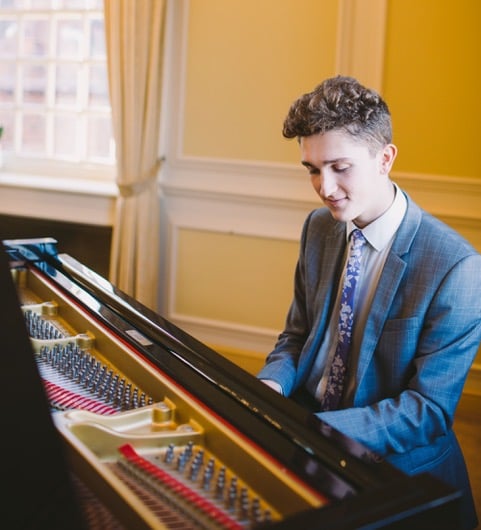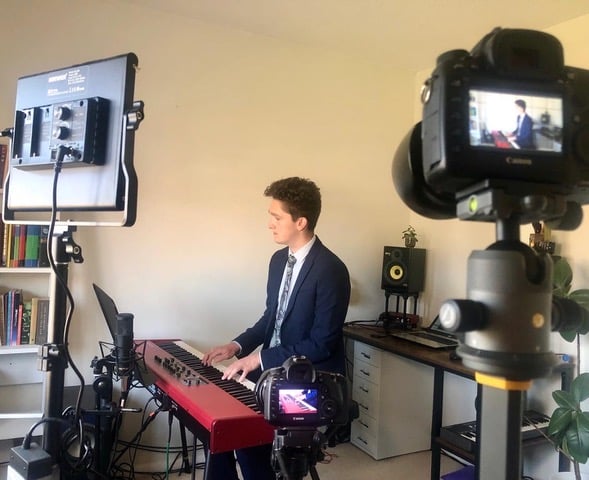David Bennett’s mini documentaries that explore the theory behind popular songs are binge-worthy much-watches on YouTube. If you haven’t checked them out, grab some popcorn and watch “How much music theory did the Beatles know?” or “Music That Sounds Like the Lyrics.”
In this episode of the Pianote Podcast, Lisa sits down with David to talk all things theory. And while that may seem like a heady topic, don’t worry! David has a gift for making a subject like music analysis accessible, relevant, and exciting.
Get exclusive access to world-class pianists and what makes them tick. Subscribe to The Note today.
David received traditional piano lessons at one point, but formal education in music didn’t mesh well with him as a child.
So David took a break from the piano until he was around 14. David would eventually study music in university, but he hasn’t had formal instruction on playing piano since he was a teen.
How did David self-teach himself so well? Mingling with other musicians probably helped. The reason he got back into piano was because his friends were learning instruments at the time and he wanted to be part of that. Over the years, he’s also learned “dribs and drabs” of music theory from playing with other musicians, especially guitarists.

You don’t need to know every aspect of music theory to make it useful. Just step in the door, take what you need, and roll with it.
David Bennett
According to David, his first “real awakening” into the power of theory was seeing the chords C, F, and G as 1, 4, and 5. (To those who are new, this is the number system at work.) David started seeing chords everywhere, and he eventually discovered that the same chords and patterns appear over and over in music.
If you want to get a taste for this, check out our video “Why Are Piano Chords EVERYTHING in Music?”
🌶️ 🎹 Want to spice up a boring chord progression? David suggests changing ONE facet of the music, such as a single chord. You can, for example, turn a major chord into its minor version. But don’t alter too much at once — just pick one thing to change.Perhaps you won’t be surprised to learn that David has always enjoyed learning math. After all, music and math have a lot in common. But here’s something you might not know: “Rhythm is ultimately the same thing as pitch,” says David.
How? Take the note A, whose frequency is 440hz. This means that A is, essentially, a rhythm hitting 440 times per second. Here’s another example: a perfect 5th interval is three oscillating sine waves against two, a frequency ratio of 3:2. See? It’s all [fun] math!
David believes that music analysis helps you appreciate the music you love. Understanding your favorite song on a deeper level — such as learning a trivia fact that reveals how special (or not!) your song is — can be fascinating to any music lover. And as you peel back the layers, you’ll discover that many songs use similar patterns while managing to sound completely unique.
Rhythm is ultimately the same thing as pitch.
David Bennett

However, David warns against getting too wrapped up in theory. Before he studied music academically, David didn’t use theory much. But when he learned about it, he became obsessed with making intricate compositions. This got in the way of creativity. After all, David believes that even Bach only used theory as something to lean on; ultimately, he composed from his imagination.
Because he had a simpler understanding of the instrument, David recovered his creativity by writing with his guitar rather than with his piano. And he now understands that complexity doesn’t necessarily translate into beautiful music.
My default [favorite pop song] would be “Strawberry Fields Forever.” Everything about it is dripping in character.
David Bennett
David Bennett’s favorite band of all time is the Beatles (his favorite pop song of all time is “Strawberry Fields Forever,” which he made a delightful video about here). He originally wanted to become a professional songwriting, and while his career has diverged more into YouTube lately, he’s had some pretty cool experiences. For one, he once had a gig recording at Abbey Road Studios, and he didn’t even notice the famous zebra crossing until he’d crossed it!
David plans to release an EP later this year, his first in about six years, and it will include a full band and vocalist.

To close off our podcast episode with David, here are some (lightly edited) answers to some quick questions:
I usually say Chopin from a classical point of view. But I have a sweet spot for Bach. What I like about him is that his music is not obsessed with melody; it’s almost like the chord progressions are the star. He was so prolific that he probably did develop formulas in his own way. But…I think he was ultimately striving for just great sounding music.
My default answer would be “Strawberry Fields Forever.” It just ticks every box! I think it’s super unique in its sound — like, no record sounds like that record, partially due to the really unique approach to recording it. But it also has such a unique chord progression, a really unique use of meter, and the lyrics are amazing. Everything about it is dripping in character. I don’t think there’s a single song written since then that sounds anything like it.
I love a good odd time signature. An odd time signature is a challenge because most of our music is in 4/4. But you occasionally get a song in 5/4 and you almost won’t realize it’s in 5/4 because they’ve handled it so well. So that’s what I love about it — making something that’s so odd (we call it odd) sound natural and organic.
Feel inspired by this interview? Try Pianote for 7 days for free and get access to our complete song library, 10-step method, and coaching from world-class piano players.
Probably temperament. You’re probably aware that a piano isn’t tuned to pure, perfect intervals. It’s compromised intervals, and the reasons behind that is a massive tangle of history and compromise based on why we want to write certain music. And it’s one of those things that you think you’ve got your head around and then you’re like, oh wait, no I haven’t!
It isn’t complexity that makes music sound good.
David Bennett
I think I would get rid of all the clefs apart from the treble clef. I understand historically why we have a bass clef. But when I’m teaching a student and you finally get through learning the treble clef, you’re like, “Now you’re going to learn a very similar but different clef — and keep an eye out for when they change!”

It could just be a treble clef but an octave down and it would still work. The only reason we have bass clef is because the note in the middle of the two can be Middle C and everything is neat and tidy…but we don’t need that! Like, how often are they actually interacting?
That’s it for this episode of the Pianote Podcast! Follow us on Spotify so you don’t miss an episode!
Lisa Witt has been teaching piano for more than 20 years and in that time has helped hundreds of students learn to play the songs they love. Lisa received classical piano training through the Royal Conservatory of Music, but she has since embraced popular music and playing by ear in order to accompany herself and others. Learn more about Lisa.
/marketing/pianote/promos/april/banner-bg-m.webp)
We use cookies for traffic data and advertising. Cookie Policy »
/marketing/pianote/promos/april/banner-title.webp)